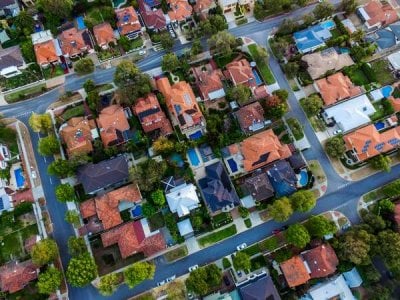Australia’s housing market faces new dangers, ex-RBA expert cautions
- Replies 0
Suppose you’ve been keeping an eye on the property market (or just shaking your head at the latest auction results).
In that case, you’ll know that buying a home in Australia is already a challenge—especially for first-timers and those hoping to help their kids or grandkids onto the ladder.
But according to a former Reserve Bank of Australia (RBA) economist, things could be about to get even tougher, and much sooner than many expected.
The Federal Government recently announced it’s fast-tracking a new housing scheme, now set to launch in October instead of the original January 2026 date.
The scheme allows eligible buyers to purchase a home with just a 5% deposit and, crucially, without the need to pay lenders’ mortgage insurance—a cost that can run into the tens of thousands.
Unsurprisingly, the announcement sent would-be buyers into a frenzy, with so many people flocking to the Housing Australia website that it crashed under the pressure.

On the surface, it sounds like a lifeline for those struggling to save a hefty deposit. But is it really the answer to our housing woes, or could it make things worse?
Martin Eftimoski, a mortgage broker and former RBA economist, has sounded a dire warning.
He believes the timing of the scheme’s launch—right in the middle of the spring property season—could supercharge demand and send prices soaring.
'Australia shuts down before Australia Day—between Christmas and Australia Day, nothing really happens, no one wants to move house, no one wants to buy a house,' Eftimoski explained.
'Launching it in January would be a whimper—doing it in October is a bang. This is smack bang in the middle of spring, which is the most intense buying season all year round. Launching this policy now is like pouring gasoline on a fire.'
The government, for its part, insists the impact on prices will be 'very minor'—just a 0.5% increase over six years, according to Treasury modelling.
Housing Minister Clare O’Neil says the scheme is part of a broader plan to build more homes and make housing more affordable, including a promise to construct 100,000 new homes for buyers.
But Eftimoski isn’t convinced. He argues that Treasury’s modelling doesn’t account for the psychological effect of the scheme—essentially, the rush of buyers desperate not to miss out.
'I think there will be a 0.5% increase in six months,' he said, suggesting the real impact could be much more immediate and significant.
Another sticking point is the scheme’s property price caps, which are set in line with average house prices in each area.
Eftimoski warns that as prices rise, these caps will quickly become outdated, pushing homes out of reach for the very people the scheme is meant to help.
'Next financial year, what do you do—do you increase it? Because the median house price in Sydney isn’t going to be $1.5 million in June next year,' he said.
The scheme has also come under fire from the opposition. Shadow Housing Minister Andrew Bragg claims the program will 'dump a $60 billion liability onto taxpayers and push house prices up by as much as 10 per cent.'
He argues that expanding the scheme without a clear plan to increase housing supply is a recipe for higher prices, not greater affordability.
Bragg also criticised the broad eligibility criteria, suggesting it could allow even the children of billionaires to access taxpayer support.
'There will be higher taxes to pay for Labor’s largesse,' he warned.
At the heart of the debate is a simple economic truth: when more people can buy, but there aren’t enough homes to go around, prices go up.
While the government’s promise to build 100,000 new homes is welcome, many experts say it’s not enough to keep pace with demand—especially with Australia’s population growing and migration numbers rebounding.
Read more: Homebuyers beware: The shocking discovery inside this WA house for sale could cost you thousands

What do you think about the government’s new housing scheme? Will it help first home buyers, or just push prices even higher? Have you or your family been affected by the ups and downs of the property market? Share your story in the comments below!
In that case, you’ll know that buying a home in Australia is already a challenge—especially for first-timers and those hoping to help their kids or grandkids onto the ladder.
But according to a former Reserve Bank of Australia (RBA) economist, things could be about to get even tougher, and much sooner than many expected.
The Federal Government recently announced it’s fast-tracking a new housing scheme, now set to launch in October instead of the original January 2026 date.
The scheme allows eligible buyers to purchase a home with just a 5% deposit and, crucially, without the need to pay lenders’ mortgage insurance—a cost that can run into the tens of thousands.
Unsurprisingly, the announcement sent would-be buyers into a frenzy, with so many people flocking to the Housing Australia website that it crashed under the pressure.

A former RBA economist has warned that bringing forward the government’s new housing scheme to October will likely cause house prices to spike, as it coincides with the busy spring buying season. Image source: Maximillian Conacher / Unsplash.
On the surface, it sounds like a lifeline for those struggling to save a hefty deposit. But is it really the answer to our housing woes, or could it make things worse?
Martin Eftimoski, a mortgage broker and former RBA economist, has sounded a dire warning.
He believes the timing of the scheme’s launch—right in the middle of the spring property season—could supercharge demand and send prices soaring.
'Australia shuts down before Australia Day—between Christmas and Australia Day, nothing really happens, no one wants to move house, no one wants to buy a house,' Eftimoski explained.
'Launching it in January would be a whimper—doing it in October is a bang. This is smack bang in the middle of spring, which is the most intense buying season all year round. Launching this policy now is like pouring gasoline on a fire.'
The government, for its part, insists the impact on prices will be 'very minor'—just a 0.5% increase over six years, according to Treasury modelling.
Housing Minister Clare O’Neil says the scheme is part of a broader plan to build more homes and make housing more affordable, including a promise to construct 100,000 new homes for buyers.
But Eftimoski isn’t convinced. He argues that Treasury’s modelling doesn’t account for the psychological effect of the scheme—essentially, the rush of buyers desperate not to miss out.
'I think there will be a 0.5% increase in six months,' he said, suggesting the real impact could be much more immediate and significant.
Another sticking point is the scheme’s property price caps, which are set in line with average house prices in each area.
Eftimoski warns that as prices rise, these caps will quickly become outdated, pushing homes out of reach for the very people the scheme is meant to help.
'Next financial year, what do you do—do you increase it? Because the median house price in Sydney isn’t going to be $1.5 million in June next year,' he said.
The scheme has also come under fire from the opposition. Shadow Housing Minister Andrew Bragg claims the program will 'dump a $60 billion liability onto taxpayers and push house prices up by as much as 10 per cent.'
He argues that expanding the scheme without a clear plan to increase housing supply is a recipe for higher prices, not greater affordability.
Bragg also criticised the broad eligibility criteria, suggesting it could allow even the children of billionaires to access taxpayer support.
'There will be higher taxes to pay for Labor’s largesse,' he warned.
At the heart of the debate is a simple economic truth: when more people can buy, but there aren’t enough homes to go around, prices go up.
While the government’s promise to build 100,000 new homes is welcome, many experts say it’s not enough to keep pace with demand—especially with Australia’s population growing and migration numbers rebounding.
Read more: Homebuyers beware: The shocking discovery inside this WA house for sale could cost you thousands
Key Takeaways
- A former RBA economist has warned that bringing forward the government’s new housing scheme to October will likely cause house prices to spike, as it coincides with the busy spring buying season.
- The scheme, allowing buyers to purchase with a 5 per cent deposit and no lenders’ mortgage insurance, has been criticised for fuelling demand without guaranteeing an increase in housing supply.
- Despite Treasury forecasting only a minor price impact of 0.5 per cent over six years, critics believe the real impact will be higher and felt much sooner, especially due to psychological and seasonal factors.
- Concerns have been raised that the policy could push property further out of reach for first home buyers and burden taxpayers, with some warning it could raise house prices by up to 10 per cent if supply isn’t increased.
What do you think about the government’s new housing scheme? Will it help first home buyers, or just push prices even higher? Have you or your family been affected by the ups and downs of the property market? Share your story in the comments below!







